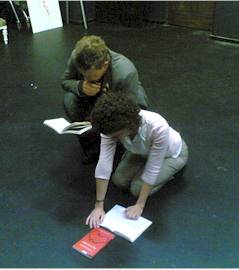Scene By Scene
John Wisehammer and Mary Brenham Exchange Words
Intention: This is an important scene in laying the foundations for the rest of the play. There is an emotional undercurrent which can be directed effectively by some of the Epic elements we will use. The scene echoes a moment in Shakespeare’s ‘The Tempest’ when Miranda sees Ferdinand piling logs for her father. Here Wisehammer moves bricks. Although this could prove difficult I want an actual pile of bricks that the actor will actually move from one side of the stage to the other. Other than that it will be an empty space. The projections here could be interesting. I think I wll use the words that the characters use and actual dictionary translations, just to gently remind the audience not to get too involved in the potential romantic involvement of the characters. There is also the potential to flash up images that could go with the words that will jar more harshly and focus the audience upon those notions. The scene is important because it engages the audience with the issues while suggesting enough about the possible feelings of these characters for each other that the choice that Mary makes later is an important one.
Rehearsal |
Text |
Performance Outcome |
|---|---|---|
| 18/09/06 | Having discussed the blocking we went through it again, this time when I clapped my hands the actors swapped roles. Again this was interesting as we had actors interpreting roles of a different gender. Yet afterwards both could pick out an interesting idea that the other had employed, giving them something to think about in their own performance, whilst noting how again their minds were elsewhere as they were simultaneously performing a role, while watching the other actor so they could continue what they were doing and also anticipating the hand clap to switch. For me, as director, I found this useful as the scene was still emotional – the emotion is in the text and so cannot be removed – but it felt clear that the actors were slightly detached, a critical distance from themselves so they can control their communication of Gest and thus Grund Gestuc in the scene. |
The interesting thing about this scene is the bricks. Not exactly scintillating theatre, but something with a resonance. There is the parallel with Ferdinand and Miranda in ‘The Tempest’. There is also the sense of pointless tasks, which comes across in our production as Wisehammer shifts bricks from one wooden bucket to another. What I like about this scene is that with Chris we have a man who is not stridently political in his portrayal. Instead he brings quietness, a sense of the intellectual dimension, which adds a tangible tenderness to the scene. This is important in setting up the choice Mary has between the loving convict Wisehammer or Ralph, the officer who can provide a better life but whose motives are more complicated. |

 I tried a number of Brechtian rehearsal techniques when exploring this scene. Amy and Chris identified the purpose of the scene as exploring the plight of the two convicts through words and their meanings. This is emotive stuff, when you look at Wisehammer’s sense of injustice and Mary’s feelings of shame. It is also a key scene in that it lays the foundations of Mary’s choice later in the play. Wisehammer is seen as an intelligent and sensitive man, therefore there is an emotional undercurrent to the scene. It is, therefore, important to ensure the emotion is subservient to the identified purpose of the scene. As we worked through it the first time I asked both actors to say either ‘he said’ or ‘she said’ after each section of dialogue. This was interesting as Chris found himself saying ‘he said’ before he’d actually finished, which helped us to identify moments where Wisehammer’s thoughts and intentions shift which in turn helped with blocking. Both actors felt that in prevented them connecting in the scene: they couldn’t be emotional as the ‘he/she said’ interrupted the flow of thoughts and emotions, also having to say ‘he/she said’ and waiting for the other actor to say it stopped them from overlapping some of the dialogue in a more naturalistic way.
I tried a number of Brechtian rehearsal techniques when exploring this scene. Amy and Chris identified the purpose of the scene as exploring the plight of the two convicts through words and their meanings. This is emotive stuff, when you look at Wisehammer’s sense of injustice and Mary’s feelings of shame. It is also a key scene in that it lays the foundations of Mary’s choice later in the play. Wisehammer is seen as an intelligent and sensitive man, therefore there is an emotional undercurrent to the scene. It is, therefore, important to ensure the emotion is subservient to the identified purpose of the scene. As we worked through it the first time I asked both actors to say either ‘he said’ or ‘she said’ after each section of dialogue. This was interesting as Chris found himself saying ‘he said’ before he’d actually finished, which helped us to identify moments where Wisehammer’s thoughts and intentions shift which in turn helped with blocking. Both actors felt that in prevented them connecting in the scene: they couldn’t be emotional as the ‘he/she said’ interrupted the flow of thoughts and emotions, also having to say ‘he/she said’ and waiting for the other actor to say it stopped them from overlapping some of the dialogue in a more naturalistic way.